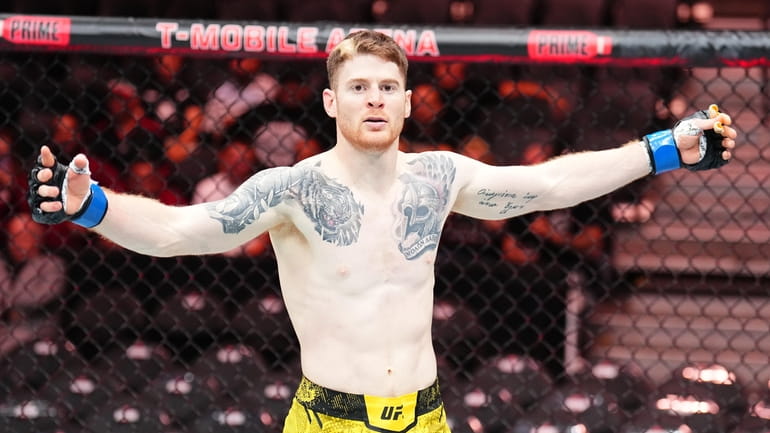East Rockaway's Charlie Campbell in a UFC state of mind

Lynbrook's Charlie Campbell reacts after his TKO victory over Alex Reyes in a lightweight fight at Noche UFC at T-Mobile Arena on Sept. 16, 2023 in Las Vegas. Credit: Zuffa LLC via Getty Images
Sometimes in MMA, a temporary separation from consciousness can put someone on a path toward getting their mind right.
Such is the case of Charlie Campbell of East Rockaway.
In August 2022, he was knocked out for the first time in his fighting career. Seconds earlier, he was a punch or two away from finishing his opponent on "Dana White's Contender Series" and reaching his dream destination — the UFC.
As he started to come back to training in October after recovering from a concussion, he suffered a different injury.
That's when he made the call.
"It was make or break for me," Campbell said. "It was either going to wash me out of this sport or it was going to make me a better martial artist."
Campbell contacted Micah Schnurstein, a sports psychologist who works with UFC fighters at its Performance Institute as well with Team USA boxers and other clients in private practice.
"When I work with any fighter, I'm not covering my eyes and just throwing things at him that might make him feel better," Schnurstein said. "They're getting the evidence based practices. And he just did a really good job at learning those skills and learning how to actually get his mind in a place that's helpful to him rather than challenging."
Since beginning to work with Schnurstein, Campbell says he's a different person in and out of the cage.
Just looking at his fighting resume would suggest more of a similarity as the LAW-MMA fighter has continued to knock out other people in short amounts of time. He's 2-0 since that loss on Dana White's Contender Series, including a first-round knockout last June in Cage Fury, followed by another first-round knockout of Alex Reyes last month in his UFC debut at Noche UFC.
CHARLIE CAMPBELL WITH THE POWER SHOTS 💥 #NocheUFC pic.twitter.com/zpwFLkXkkc
— ESPN MMA (@espnmma) September 17, 2023
Campbell said he notices the difference beyond those documentable statistics since he started speaking to a sports psychologist and reading and listening to others in the bigger discipline of psychology.
"A hundred percent, it's up there as one of the main reasons I'm able to perform the way I do," Campbell said. "There are so many mental techniques and skills that I've been taught by Micah Schnurstein that I'm actively doing all fight week. We have specific skills that I use in the cage prior to the fight about to begin where your mind wants to race and think about all these worst-case scenarios and stuff. It's very hard to bring your mind back to where it should be so you could give yourself the best chance of winning and performing your best. And I have specific skills that I that I do actively when I'm in there."
So that's fight night, but what about the other 360-plus days on the calendar year?
"I'm constantly mentally resetting throughout the day, because our mind wants to wander so much," Campbell said. "And you have to work on these mental skills in order to learn how to control your mind and thoughts. That way you can bring your mind back to the present moment, bring your balloon back to right now and focus.
"I've turned all these challenges in my life into positives."
Campbell no longer has problems. Instead, they are called challenges.
"We spend a ton of time, because the brain is negative, dwelling on things that have already happened, that takes our mood down, or then worrying about what's going to happen in the future, and then making ourselves anxious," said Schnurstein, who played seven seasons of minor-league baseball after being drafted out of high school by the Chicago White Sox. "The last place we are is just present, focused on what we can control. And there's so much that goes behind that and skills that can support you, once you know, but the challenge is we don't talk a lot about this stuff. And then you're at the mercy of thoughts and feelings and all this stuff that brought you in the first place."
Campbell has been talking about it all for several months. And last month, he did more talking -- some with his fists and some with a microphone.
After picking up the TKO win at Noche UFC last month — a fight he accepted on a week's notice, as so many debuting fighters do — Campbell channeled the psyche of someone else. He use one of former WWE star Dwayne "The Rock" Johnson's famous bits — the "It doesn't matter what you think" interruption — during his in-cage interview.
Funniest moment of the night so far pic.twitter.com/uWwMwqGOlv
— Rami Hanna (@WhoElseButRami) September 17, 2023
One of the key points of the in-ring interview after a fight is to help build stars. Campbell's clip accomplished the task. It put him on loop in social media, got people talking about "The Cannibal" and built excitement for his next fight.
The unintended consequence was sort of embarrassing the interviewer, former two-division champion Daniel Cormier. Campbell said he ran into Cormier a few days later in Las Vegas.
"I began with an apology," Campbell said. "And we hugged it out and he said he was happy for me."

